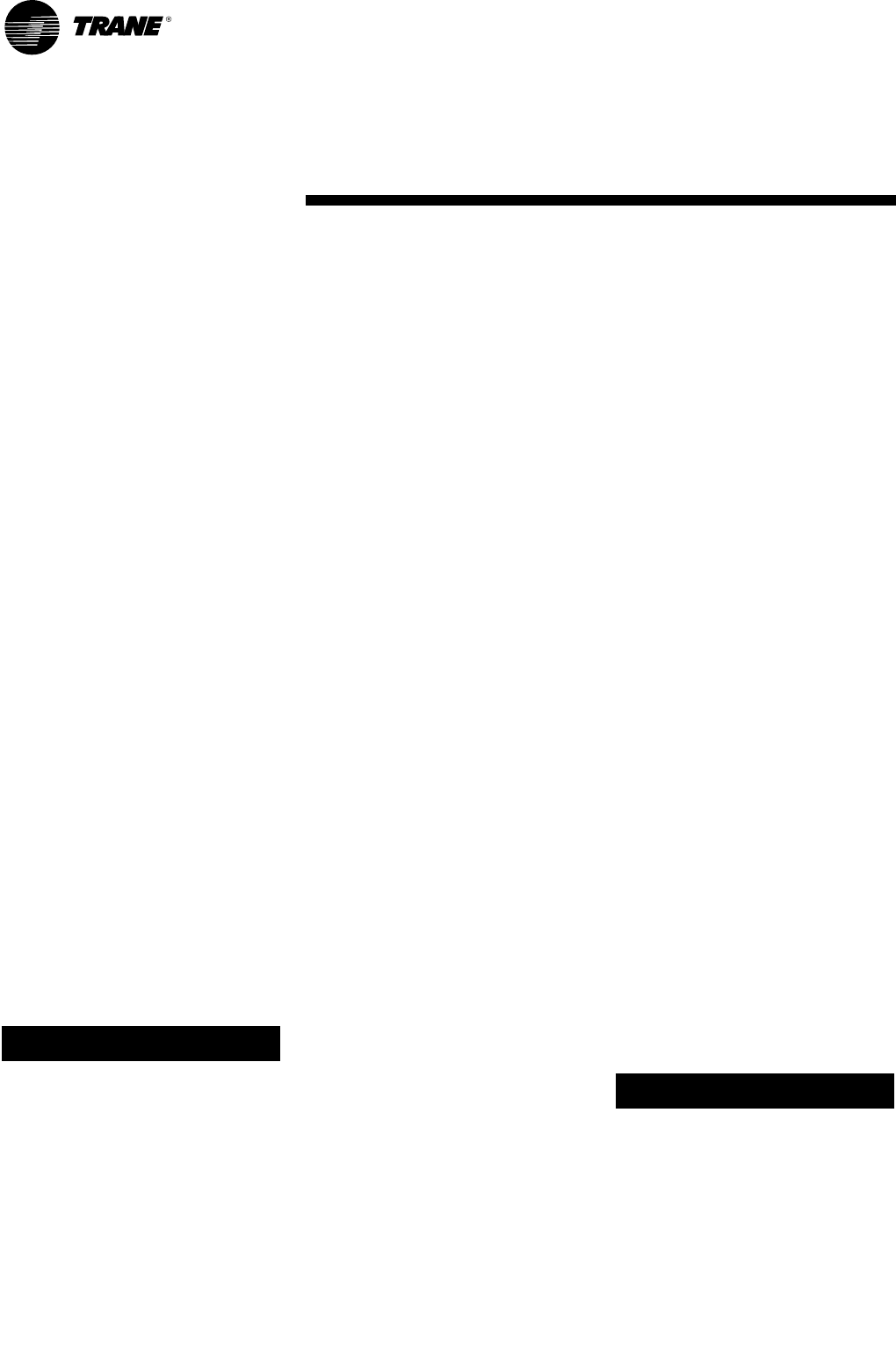
30
Factory (initial) Oil-Charging
Procedure
The initial charging procedure
should be followed any time the unit
is new or has had all of the oil
removed.
1. Add 0.95 liter (0.90 kg) of oil to the
motor cavity or suction line prior
to installing the compressor into
the chiller.
2. If the unit is not equipped with
suction-line isolation valves, it
should contain no charge. If it has
isolation valves, then the charge
may be trapped in the evaporator.
In either case, the high side of the
system should not be pressurized.
3. The oil-line shutoff valve must be
open to allow the oil to pass into
the oil lines and the oil separator.
4. The oil charging port is a ¼"
[6 mm] flare fitting with a Schrader
valve that is on the side of the oil-
filter housing. This is the port that
must be used to add oil into the
compressor so that the filter and
lines are full at the first start of the
compressor.
5. On single-compressor circuits, all
the oil should be put into the
circuit through the oil-charging
port on the compressor filter
housing. On two-compressor
circuits, put approximately ½ of
the oil into the unit through each
of the two oil-charging ports on
the two compressors.
6. Oil may be put into the unit using
either of two methods:
ƽƽ CCAAUUTTIIOONN
Use only Trane OIL 00048 in the units
to avoid any catastrophic damage to
the compressor or unit.
• Have the unit in vacuum. Note that
the vacuum connection should be
made on the unit at the service
valve that is on the discharge line.
Hook up one end of the oil-charging
hose to the oil-charging fitting and
immerse the other end into the oil
container. Let the vacuum draw the
required amount of oil into the unit.
• Have the unit at the same pressure
as the oil. Hook up one end of the
oil-charging hose to the oil-
charging fitting and the other end
to an oil pump. Use the pump to
draw oil out of the oil container and
push the required amount of oil
into the unit. Note: the compressor
filter has an internal shutoff valve
that will prevent oil from entering
the compressor while the
compressor is not running.
Therefore, there is no concern
about flooding the compressor with
oil.
Field Oil-Charging
Procedure
Use the initial charging procedure
under the following circumstances:
• When virtually all of the oil has
been removed.
• If the oil charge is removed from
the compressor and oil system
only, but the unit has been run for
less than 15 minutes.
• If the oil charge is removed from
the compressor and oil system
only, and the unit has been run for
more than 15 minutes.
However, reduce the amount of oil
added to the unit by the normal
quantity of oil in the refrigeration
system.
Note: this procedure can be followed
even with the refrigerant charge
isolated in the evaporating section of
the unit.
If small quantities of oil were
removed to service refrigeration
components, such as the evaporator,
replace the oil that was removed
back into the serviced component
prior to vacuum and recharge of the
refrigerant.
If oil was removed to service a
compressor or change the filter
follow this procedure:
1. If the compressor is a new
compressor or has been removed
from the system and reworked,
add 0.95 liter (0.90 kg) of oil to the
motor cavity prior to installing the
compressor into the chiller.
2. Install the compressor in the
system. Make sure that the filter
shutoff valve is closed. Other
compressor isolation valves may
also be closed depending upon
the service that was completed.
For example, changing the oil filter
would require the compressor to be
isolated and pulled into vacuum.
Note: Ensure that the compressor is
not pressurized.
3. Open the flare fitting on the oil-line
shutoff valve.
4. Open the flare fitting on the filter
housing. This is the port that must
be used to put oil into the
compressor.
5. Install one end of the charging
hose on the oil charging port (with
the Schrader valve) and the other
on the oil canister.
6. Lift the oil canister, or use a pump,
to pour oil into the filter housing.
7. When oil comes out of the flare
fitting on the oil-line shutoff valve,
the filter is full. Stop adding oil.
8. Put the cap on the flare on the oil-
line shutoff valve, remove the
charging hose, and put the cap
back on the flare on the filter
housing.
9. Vacuum the compressor (low side)
and prepare it for inclusion in the
system. There is a service valve on
the suction line and on the
evaporator. Use these valves to
vacuum the compressor.
10. Open the oil-line shutoff valve.
Severe damage to the
compressor can result if the oil-
line shutoff valve is closed when
the compressor is started.
ƽƽ CCAAUUTTIIOONN
Catastrophic damage to the
compressor will occur if the oil-line
shutoff valve or the isolation valves
are left closed on unit startup.
11. Open the other compressor
isolation valves.
Note: this procedure assumes that
the oil that is put into the filter
housing does not have contaminants
such as non- condensable gases. The
oil forces these gases out of the filter
Maintenance
RLC-SVX03A-E4


















